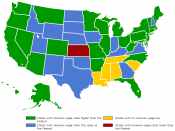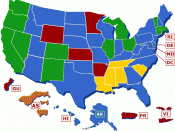It sounds simple raise the minimum wage, reward hard work, and strike a blow against the society's inequalities. It's an emotional argument that blurs out the truth and make's people forget one important economic lesson: There's no such thing as a free lunch. The minimum wage has not been increased since the industrial welfare commission raised it to $4.25 an hour. The IWC and the legislature have not agreed since that time that any additional increase is justified because of California's recession and the downward turn in the business climate. There was a measure out on this last ballot called prop 210 which passed and increased the minimum wage from $4.25 an hour to $4.75 an hour and on March 1, 1997 it will raise to $5.00 an hour and beginning March 1, 1998 it will increase to $5.75. The minimum wage in California has increased nine times in the past thirty years rising from $1.30
per hour in the mid 1960's to $4.25 per hour as of July 1996. The increase has been less than the rate of inflation during this period.
The vast majority of the 22,000 members of the American Economic Association agree that increasing the minimum wage will increase unemployment among young, unskilled workers. This 35% hike in the minimum wage paid by the business will be one of the biggest increases in California history. And, it will hit just when the state is recovering from a long recession. Approximately 2 million of California's nearly 13 million workers earn less than $5.75 per hour. Most of these workers would be directly affected by this increase. Roughly one-forth of those earning less than the proposed $5.75 minimum wage are teenagers, while the remaining three-fourths are adults age 20 and over. Industries employing significant numbers of these...


